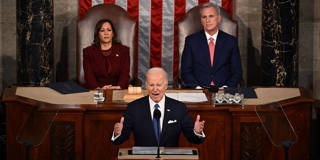The kind of populist and nationalist impulses that featured so prominently in US President Joe Biden’s State of the Union address nearly always lead to bad policy. The United States needs to move past the “grievance-onomics” that have prevailed since the 2008 financial crisis.
WASHINGTON, DC – Populism surged in response to the 2008 financial crisis. On the political left in the United States, the Occupy Wall Street movement, overblown concerns about income inequality, and Bernie Sanders’s unexpectedly strong 2016 presidential primary campaign signaled a large shift from the more centrist politics of the pre-Great Recession era. On the right, of course, Donald Trump rode a wave of populist grievance, xenophobia, and nationalism to win the White House.
Promising a return to normalcy, Joe Biden then beat Sanders in the 2020 Democratic Party presidential primary and defeated Trump in the general election. Yet in his 2023 State of the Union address – which should be viewed as the roadmap for a potential re-election campaign – Biden, too, offered an ample serving of populism. Despite his defeat of an incumbent president in 2020 – an uncommon feat in US history – Biden apparently thinks that the 2024 election will unfold in a Trump-Sanders world.
Consider how Biden positioned himself on four key issues. First, he advocated “buy American” policies for government contracts, championed domestic manufacturing workers, and criticized previous administrations for not doing enough on this front. He then announced “new standards to require all construction materials used in federal infrastructure projects” – from lumber, glass, and drywall to fiber-optic cables – “to be made in America,” declaring, “On my watch, American roads, American bridges, and American highways will be made with American products.”

WASHINGTON, DC – Populism surged in response to the 2008 financial crisis. On the political left in the United States, the Occupy Wall Street movement, overblown concerns about income inequality, and Bernie Sanders’s unexpectedly strong 2016 presidential primary campaign signaled a large shift from the more centrist politics of the pre-Great Recession era. On the right, of course, Donald Trump rode a wave of populist grievance, xenophobia, and nationalism to win the White House.
Promising a return to normalcy, Joe Biden then beat Sanders in the 2020 Democratic Party presidential primary and defeated Trump in the general election. Yet in his 2023 State of the Union address – which should be viewed as the roadmap for a potential re-election campaign – Biden, too, offered an ample serving of populism. Despite his defeat of an incumbent president in 2020 – an uncommon feat in US history – Biden apparently thinks that the 2024 election will unfold in a Trump-Sanders world.
Consider how Biden positioned himself on four key issues. First, he advocated “buy American” policies for government contracts, championed domestic manufacturing workers, and criticized previous administrations for not doing enough on this front. He then announced “new standards to require all construction materials used in federal infrastructure projects” – from lumber, glass, and drywall to fiber-optic cables – “to be made in America,” declaring, “On my watch, American roads, American bridges, and American highways will be made with American products.”